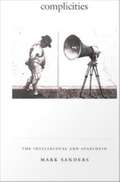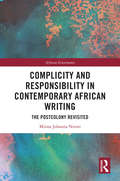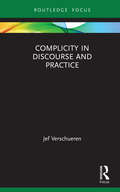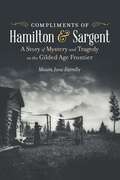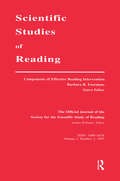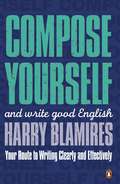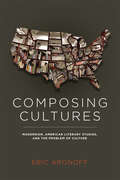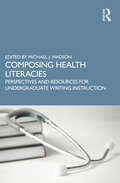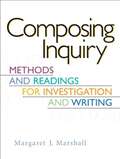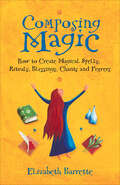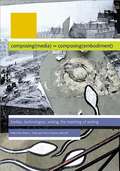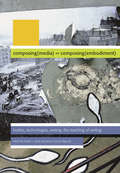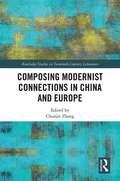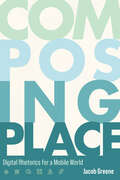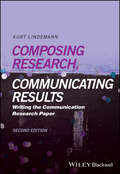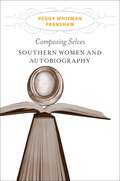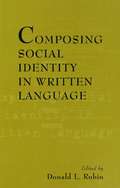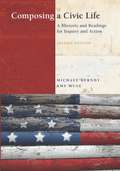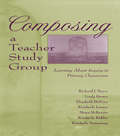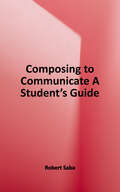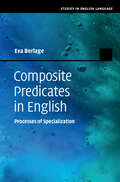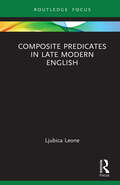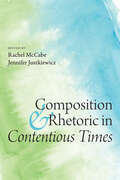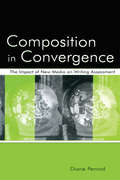- Table View
- List View
Complicities: The Intellectual and Apartheid
by Mark SandersComplicities explores the complicated--even contradictory--position of the intellectual who takes a stand against political policies and ideologies. Mark Sanders argues that intellectuals cannot avoid some degree of complicity in what they oppose and that responsibility can only be achieved with their acknowledgment of this complicity. He examines the role of South African intellectuals by looking at the work of a number of key figures--both supporters and opponents of apartheid. Sanders gives detailed analyses of widely divergent thinkers: Afrikaner nationalist poet N. P. van Wyk Louw, Drum writer Bloke Modisane, Xhosa novelist A. C. Jordan, Afrikaner dissident Breyten Breytenbach, and Black Consciousness leader Steve Biko. Drawing on theorists including Derrida, Sartre, and Fanon, and paying particular attention to the linguistic intricacy of the literary and political texts considered, Sanders shows how complicity emerges as a predicament for intellectuals across the ideological and social spectrum. Through discussions of the colonial intellectuals Olive Schreiner and Sol T. Plaatje and of post-apartheid feminist critiques of the Truth and Reconciliation Commission, Complicities reveals how sexual difference joins with race to further complicate issues of collusion. Complicities sheds new light on the history and literature of twentieth-century South Africa as it weighs into debates about the role of the intellectual in public life.
Complicity and Responsibility in Contemporary African Writing: The Postcolony Revisited (African Governance)
by Minna Johanna NiemiThis book investigates the many ways in which contemporary African fiction has reflected on themes of responsibility and complicity during the postcolonial period.Covering the authors Ayi Kwei Armah, Tsitsi Dangarembga, Nuruddin Farah, Michiel Heyns, and J. M. Coetzee, the book places each writer’s novels in their cultural and literary context in order to investigate similarities and differences between fictional approaches to individual complicity in politically unstable situations. In doing so, the study focuses on these texts’ representations of discomforting experiences of being implicated in harm done to others in order to show that it is precisely during times of political crisis that questions of moral responsibility and implicatedness in compromised conduct become more pronounced. The study also challenges longstanding western amnesia concerning responsibility for historical and present-day violence in African countries and juxtaposes this denial of responsibility with the western literary readership’s consumption of narratives of African “suffering.” The study instead proposes new reading habits based on an awareness of readerly complicity and responsibility. Drawing insights from across political philosophy and literary theory, this book will be of interest to researchers of African literature, postcolonial studies, and peace and conflict studies.
Complicity in Discourse and Practice (Routledge Focus on Applied Linguistics)
by Jef VerschuerenIt is commonplace to say that we are living in troubled times. Liberal democracy is in crisis. Academic freedom is seriously constrained. The media offers less insight and analysis than could be expected given the proliferation of communication tools. Based on decades of research into the social and ideological functioning of discourse and with a focus on politics, universities, and the media, Jef Verschueren offers an analysis of current practices, asks whether we are all complicit, and makes suggestions for what we can do. Central to this book is the notion of derailed reflexivity, referring to the observation that politics, institutions, and news reporting tend to be excessively aimed at public opinion, impression management, and clicks, to the detriment of policies addressing social justice issues, high-quality service, and media content. Highlighting that education is the cornerstone for democratic choices and ensures that we can critically assess media content, this book shows that shared responsibility can be a source of hope and that everyone has the power to intervene. Complicity in Discourse and Practice is a call to action for readers and a plea for actively minding the ecology of the public sphere.
Compliments of Hamilton and Sargent: A Story of Mystery and Tragedy on the Gilded Age Frontier
by Maura Jane FarrellyMaura Jane Farrelly explores the history of the nineteenth-century United States via the lives of three people from prominent East Coast families who moved to Wyoming to escape a host of humiliations—only to discover that by 1890 the West was no longer a place where anyone could go to be forgotten and start over.
Components of Effective Reading Intervention: A Special Issue of scientific Studies of Reading
by Barbara R. FoormanLearning to read is not natural for many individuals, who remain dependent on the skill, knowledge, and persistence of their teachers to acquire reading proficiency. Reading instruction, however, can be designed with greater validity than ever before because of a solid, converging body of scientific research on reading acquisition, reading processes, and reading disabilities. This special issue presents some of the major advances in methodologically and theoretically sound treatment research by the use of comprehensive and multivariate treatment protocols and individual growth-curve modeling.
Compose Yourself: and write good English
by Dr Harry BlamiresThis book has a simple thesis: to write well you need to think clearly about what you want to say.Blamires brings the reader's common sense into play to illustrate how by thinking through what you want to say and how you say it, you can communicate both effectively and elegantly. There are a lot of contemporary examples from magazines, books, advertising material and the like to illustrate both good and bad English.
Composing Cultures: Modernism, American Literary Studies, and the Problem of Culture (Cultural Frames, Framing Culture)
by Eric AronoffThe term "culture" has become ubiquitous in both academic and popular conversations, but its usefulness is a point of dispute. Taking the current shift from cultural studies to aesthetics as the latest form of this discussion, Eric Aronoff contends that in American modernism, the concepts of culture and of aesthetics have always been inseparable. The modernist concept of culture, he argues, arose out of an interdisciplinary dialogue about value, meaning, and form among social critics, artists, anthropologists, and literary critics, including figures as diverse as Van Wyck Brooks, Edward Sapir, Willa Cather, Lewis Mumford, John Crowe Ransom, Raymond Weaver, and Allen Tate. These figures proposed new ways to conceive of culture that intertwined theories of aesthetic and literary value with theories of national, racial, and regional identity. Through close readings, Aronoff shows that disciplines and approaches that are often thought of as opposed—cultural anthropology and aesthetics, American literary history and literary criticism, and multiculturalism and regionalism—are in fact engaged in common debate and proceed from shared arguments about culture and form.
Composing Health Literacies: Perspectives and Resources for Undergraduate Writing Instruction
by Michael J. MadsonThis edited collection examines engagements between health literacies and undergraduate writing instruction, providing research, case studies, and practical guidance on developing an interdisciplinary writing pedagogy. Bringing together works from scholars in rhetoric and composition, technical communication, UX, public health, nursing, and writing center administration, this collection showcases a range of evidence-based practices for composing, teaching, and assessing health literacies, which the readers can apply to their own contexts. Using non-specialist language accessible to instructors from a variety of backgrounds, the chapters consider the use of writing assignments including image analyses, public service announcements, podcasts, health education materials, illness narratives, public presentations, research proposals, and journal articles. The book offers a holistic overview by profiling entire writing programs, both online and face-to-face, that teach health literacies across their curricula. This evidence-based collection is essential reading for scholars and instructors in rhetoric and composition, writing in the health professions, technical communication, and health humanities, and can be used as a supplemental textbook for pedagogy courses in these fields.
Composing Inquiry: Methods and Readings for Investigation and Writing
by Joanna Johnson Margaret J. Marshall Isis Artze-Vega James Britton Deirdre Fagan Judy HoodThe first composition text to present in-depth primary and secondary research methods, disciplinary readings and writing instruction to facilitate authentic investigations. <p><p> Composing Inquiry is a reader/rhetoric that takes seriously the call to engage undergraduates in intellectual work. All of the readings included here serve to illustrate methods of research and investigation used in various academic disciplines, and all inspire similar projects that can be done by undergraduate students as they learn to work on their writing. <p><p>Unlike traditional readers, Composing Inquiry also includes chapters meant to help students understand methods of inquiry commonly used by scholars to collect data or test theories. These method chapters can be used in conjunction with the readings or independently, depending on the program/course goals or the preferences of individual teachers.
Composing Magic: How to Create Magical Spells, Rituals, Blessings, Chants and Prayer
by Elizabeth Barrette“Like a modern Saraswati [the author] leads us through the brainstorming for a topic, rhythm, meter, poetic form, self-editing, and ritual literature.” —Barbara Ardinger, Ph.D., author of Pagan Every DayYou’ve attended rituals that took your breath away. You’ve borrowed spells out of books. You’ve read splendid Pagan poetry in magazines. Now learn to compose all these types of magical writing yourself! Composing Magic guides you through the exciting realm of magical and spiritual writing.You’ll explore the process of writing, its tools and techniques, individual types of composition, and ways of sharing your work with other people. The book shows you how to write:• Basic and advanced forms of poetry• Spells• Chants and rounds• Prayers• Blessings• Solitary and group ritualsEach type of writing includes its history and uses, which cover diverse traditions. Step-by-step instructions lead you through the creative process. Examples demonstrate finished compositions of each type, while exercises help you develop your skills by practicing what you’ve just read. You’ll discover that magical writing has more impact when it comes from the heart. Anyone can develop the skills needed to create effective compositions, but the most successful writers reveal their souls. Composing Magic will also show you ways of deepening your craft through performance and publication. Whether you practice solitary or in a group, this book will help you write with more power, more beauty, and less effort.“A smart, well-crafted book.” —Kenaz Filan, managing editor of newWitch“Composing Magic blends the craft of poetry and the Craft of magic in one dish.” —Chas S. Clifton, author of Her Hidden Children: The Rise of Wicca and Paganism in America
Composing Media Composing Embodiment
by Anne Wysocki Kristin L Arola"What any body is--and is able to do--cannot be disentangled from the media we use to consume and produce texts." ---from the Introduction.Kristin Arola and Anne Wysocki argue that composing in new media is composing the body--is embodiment. In Composing (Media) = Composing (Embodiment), they have brought together a powerful set of essays that agree on the need for compositionists--and their students--to engage with a wide range of new media texts. These chapters explore how texts of all varieties mediate and thereby contribute to the human experiences of communication, of self, the body, and composing. Sample assignments and activities exemplify how this exploration might proceed in the writing classroom.Contributors here articulate ways to understand how writing enables the experience of our bodies as selves, and at the same time to see the work of (our) writing in mediating selves to make them accessible to institutional perceptions and constraints. These writers argue that what a body does, and can do, cannot be disentangled from the media we use, nor from the times and cultures and technologies with which we engage. To the discipline of composition, this is an important discussion because it clarifies the impact/s of literacy on citizens, freedoms, and societies. To the classroom, it is important because it helps compositionists to support their students as they enact, learn, and reflect upon their own embodied and embodying writing.
Composing Media Composing Embodiment
by Kristin L. Arola and Anne Frances Wysocki“What any body is—and is able to do—cannot be disentangled from the media we use to consume and produce texts.” ---from the Introduction. Kristin Arola and Anne Wysocki argue that composing in new media is composing the body—is embodiment. In Composing (Media) = Composing (Embodiment), they havebrought together a powerful set of essays that agree on the need for compositionists—and their students—to engage with a wide range of new media texts. These chapters explore how texts of all varieties mediate and thereby contribute to the human experiences of communication, of self, the body, and composing. Sample assignments and activities exemplify how this exploration might proceed in the writing classroom. Contributors here articulate ways to understand how writing enables the experience of our bodies as selves, and at the same time to see the work of (our) writing in mediating selves to make them accessible to institutional perceptions and constraints. These writers argue that what a body does, and can do, cannot be disentangled from the media we use, nor from the times and cultures and technologies with which we engage. To the discipline of composition, this is an important discussion because it clarifies the impact/s of literacy on citizens, freedoms, and societies. To the classroom, it is important because it helps compositionists to support their students as they enact, learn, and reflect upon their own embodied and embodying writing.
Composing Modernist Connections in China and Europe (Routledge Studies in Twentieth-Century Literature)
by Chunjie ZhangGlobal modernisms are marked by tremendous transformations in lifestyle, historical consciousness, cultural values, ethics, wars, and crises. This book emphasizes modernist connections within literature, culture, history, and media beyond the nation state and the bifurcation between East and West. Instead of deconstructing and separating, Composing Modernist Connections in China and Europe composes and forges new combinations, linkages, and translations that place Chinese and European modernisms on an equal footing. This book features contributions on James Joyce, Stefan George, Hugo von Hofmannsthal, Anna Seghers, Qian Zhongshu, Weimar labor modernism, Chinese wartime literature, Chinese movies in divided Germany, and Sinophone modernity among other subjects.
Composing Place: Digital Rhetorics for a Mobile World
by Jacob GreeneComposing Place takes an innovative approach to engaging with the compositional affordances of mobile technologies. Mobile, wearable, and spatial computing technologies are more than the latest marketing gimmick from a perpetually proximate future; they are rather an emerging composing platform through which digital writers will increasingly create and distribute place-based multimodal texts. Jacob Greene utilizes and develops a rhetorical framework through which writers can leverage the affordances of these technologies by drawing on theoretical approaches within rhetorical studies, multimodal composition, and spatial theory, as well as emerging “maker” practices within digital humanities and critical media studies, to show how emerging mobile technologies are poised to transform theories, practices, and pedagogies of digital writing. Greene identifies three emerging “modalities” through which mobile technologies are being used by digital writers. First, to counter dominant discourses in contested spaces; second, to historicize entrenched narratives in iconic spaces; and third, to amplify marginalized voices in mundane spaces. Through these modalities, Greene employs Indigenous philosophies and theories that upend the ways that the discipline has centered placed-based rhetorics, offering digital writers better strategies for using mobile media as a platform for civic deliberation, social advocacy, and political action. Composing Place offers close analyses of mobile media experiences created by various artists and digital media practitioners, as well as detailed overviews of Greene’s own projects (also accessible through the companion website: www.composingplace.com). These projects include a digital “countertour” of SeaWorld that demonstrates the ways in which the attraction is driven by capitalism; an augmented reality tour of Detroit’s Woodward Avenue; and a mobile advocacy project in Jacksonville, Florida, that demonstrates the inequitable effects of car-centric public infrastructure. Ultimately, by engaging with these theoretical frameworks, rhetorical design principles, and pedagogical practices of mobile writing, readers can utilize the unique affordances of mobile media in various teaching and research contexts.
Composing Research, Communicating Results: Writing the Communication Research Paper
by Kurt LindemannOffers practical guidance on writing communication research papers in an evolving academic landscape Writing remains central to student assessment and professional development, yet many students enter communication classes without the skills needed to craft effective, scholarly work. Composing Research, Communicating Results: Writing the Communication Research Paper is a comprehensive, practice-based guide to academic writing in communication and related social sciences. Walking students through every stage of the writing process—from brainstorming and outlining to constructing sentences and presenting their final papers—Kurt Lindemann demystifies writing through clear explanations, practical exercises, and real student examples. With the rapid emergence of AI writing tools, students need more than tips—they need ethical frameworks and critical strategies for integrating these technologies into their work. This edition addresses these needs head-on, providing real-world advice on maintaining academic integrity when using AI in the writing process. Expanded content also includes a new chapter on incorporating feedback into revisions, and enhanced discussions on inclusive language, citation practices, and diversity in source selection. Applying writing principles specifically to communication-focused assignments such as literature reviews and application papers, Composing Research, Communicating Results: Offers the most comprehensive treatment available of sentence and paragraph construction in communication writing Equips students to present and submit papers to academic and professional outlets, including conferences and podcasts Introduces the TESLA Method for effective paragraph development and writing flow Highlights common grammar issues with accessible, relatable explanations Features pedagogical tools such as “Write Away” exercises, “Building Blocks” assignments, “Engaging Ethics” tips, and “Student Spotlight” examples Composing Research, Communicating Results: Writing the Communication Research Paper, Second Edition, is perfect for upper-division undergraduate and graduate-level courses in Communication, including methods, media, interpersonal, intercultural, and organizational communication. It fits within Communication and related social science degree programs as a writing companion text or course supplement.
Composing Selves: Southern Women and Autobiography (Southern Literary Studies)
by Peggy Whitman PrenshawIn Composing Selves, award-winning author Peggy Whitman Prenshaw provides the most comprehensive treatment of autobiographies by women in the American South. This long-anticipated addition to Prenshaw's study of southern literature spans the twentieth century as she provides an in-depth look at the life-writing of eighteen women authors.Composing Selves travels the wide terrain of female life in the South, analyzing various issues that range from racial consciousness to the deflection of personal achievement. All of the authors presented came of age during the era Prenshaw refers to as the "late southern Victorian period," which began in 1861 and ended in the 1930s. Belle Kearney's A Slaveholder's Daughter (1900) with Elizabeth Spencer's Landscapes of the Heart and Ellen Douglas's Truth: Four Stories I Am Finally Old Enough to Tell (both published in 1998) chronologically bookend Prenshaw's survey.She includes Ellen Glasgow's The Woman Within, Marjorie Kinnan Rawlings's Cross Creek, Bernice Kelly Harris's Southern Savory, and Zora Neale Hurston's Dust Tracks on a Road. The book also examines Katharine DuPre Lumpkin's The Making of a Southerner and Lillian Smith's Killers of the Dream.In addition to exploring multiple themes, Prenshaw considers a number of types of autobiographies, such as Helen Keller's classic The Story of My Life and Anne Walter Fearn's My Days of Strength. She treats narratives of marital identity, as in Mary Hamilton's Trials of the Earth, and calls attention to works by women who devoted their lives to social and political movements, like Virginia Durr's Outside the Magic Circle.Drawing on many notable authors and on Prenshaw's own life of scholarship, Composing Selves provides an invaluable contribution to the study of southern literature, autobiography, and the work of southern women writers.
Composing Social Identity in Written Language
by Donald L. RubinThis volume constitutes a unique contribution to the literature on literacy and culture in several respects. It links together aspects of social variation that have not often been thus juxtaposed: ethnicity/nationality, gender, and participant role relations. The unifying theme of this collection of papers is that all of these factors are aspects of writers' identities -- identities which are simultaneously expressed and constructed in text. The topic of social identity and writing can be approached from a variety of scholarly avenues, including humanistic, critical, and historical perspectives. The papers in the present volume make reference to and contribute to such humanistic perspectives; however, this book lies squarely within the tradition of social science. It draws primarily upon the disciplines of linguistics, discourse analysis, anthropology, social and cognitive psychology, and education studies. The constituent topics of social identity, style, and writing themselves lie at the intersections of several related fields of scholarship. Writing remains of peak interest to educators from many fields, and is still a "hot" topic. The instructional ramifications of the particular issues addressed in this volume are of vital concern to educational systems adjusting to the realities of our multicultural society. This publication, therefore, should attract a substantial and diverse readership of scholars, educators, and policymakers affiliated with many fields including applied linguistics, composition and rhetoric, communication studies, dialect studies, discourse analysis, English composition, English/language arts education, ethnic studies, language behavior, literacy, sociolinguistics, stylistics, women's studies, and writing research and instruction.
Composing a Civic Life, A Rhetoric and Readings for Inquiry and Action, Second Edition
by Michael Berndt Amy MuseComposing a Civic Life, A Rhetoric and Readings for Inquiry and Action, Second Edition, is a 600 page Freshman reader compiled and written by the Minnesota academics Michael Berndt and Amy Muse. It contains progressively arranged essays on citizenship, community life, race and gender relations, family and marriage issues, world connections, and environmental concerns. These are embedded in an elaborate teaching apparatus detailing points of composition, writing projects, and classroom activities. The authors describe their goals in these words: We wrote the first edition of Composing a Civic Life between 1999 and 2002; during that period we witnessed a broad calling for civic engagement. Social, religious, and political leaders were urging Americans to become more engaged in their communities. Scholars and activist writers such as Robert Putnam, Jedediah Purdy, and Paul Rogat Loeb were calling citizens to strengthen community ties. Politicians and community leaders including Al Gore, Sam Nunn, Ervin Duggan, and Colin Powell were calling citizens to renew America's social contract by volunteering or participating in community affairs. Since that time, we have seen many examples of increased civic engagement, from the expansion of organizations such as Moveon.org and True Majority to the renewed civic mission of high schools and universities.
Composing a Teacher Study Group: Learning About Inquiry in Primary Classrooms
by Richard J. Meyer With Linda Brown Elizabeth DeNino Kimberly Larson Mona McKenzieThere has been a flurry of writing about teachers as inquirers and researchers as well as books about children as inquirers. This volume brings these two areas together -- teachers and students are inquiring at Ridgeway Elementary School. It demonstrates the importance of thought collectives as forums for student and teacher learning. The children in the primary classrooms in this book are working to understand the world around them and their place in it as literate individuals. Their teachers are studying themselves and the students. No other book describes the way this work affects children, teachers, and the ethos of the school in which the work occurs. In that sense, this book is groundbreaking in that it is an honest portrayal of the joys and sorrows, the successes and the stumbling blocks, the clear vision, and the obfuscating that teachers live as they enact a life of asking questions, being curious, wandering, and wondering. Acknowledging and honoring the many faces of inquiry in schools, this book demonstrates the children's inquiry, their teachers' inquiry, and the place of that inquiry in schools. It lays out the ways in which inquiry is fundamental to teaching and learning in a democracy in which all of the members of the community have a voice in deciding curricular directions and ways of presenting learning. Teachers are presented as thinkers and learners, not merely as technicians enacting others' views of what is to be learned and when. Readers will find teachers dealing with the real issues of life in schools; they will see how teachers can use their existing situations as points of departure for their growth and their students' learning.
Composing to Communicate: A Student's Guide
by Robert SabaThis book takes a conversational, "how to" approach to show you how writing connects to your academic and career goals. The textbook’s jargon-free instruction provides you with accessible strategies that can be applied to all of your college writing tasks. The textbook focuses on teaching you how you can use writing and communicating to solve real problems and address issues that matter to you. It supports this theme by presenting student writing samples that demonstrate how writing for class can be more than just an academic exercise. Learning objectives open each chapter so you can focus on the most important points. The variety of writing projects, readings, and interviews with student writers aim to make your composition course more interesting than you may have imagined it could be.
Composite Predicates in English: Processes of Specialization (Studies in English Language)
by Eva BerlageComposite Predicates (CPs) are of particular interest to linguists in that only some of them are semantically restricted in present-day English, while others are not. This book explores the semantic-syntactic evolution of twenty-four different CPs in English from the sixteenth to twentieth centuries, showing why some specialize over time while others do not. It highlights that the semantic scope and evolution of the morphologically and semantically related simple verb acts as a powerful predictor of whether or not a CP becomes semantically restricted in the course of time. In all those cases where CPs undergo specialization, semantic changes take place earlier than syntactic ones. Finally, large-scale corpus-analyses reveal that the CPs, which, in comparison to their morphologically simple verbs, can be considered analytic constructions, decrease from the nineteenth to twentieth century or show consistently low frequencies. This finding runs counter to the trend of English to become increasingly analytic.
Composite Predicates in Late Modern English (Routledge Focus on Linguistics)
by Ljubica LeoneThis volume provides a concise overview of the diachronic development of composite predicates (CPs) in Late Modern English, offering clearer evidence of ongoing language change using data less readily available in other corpora.While previous scholarship on CPs exists from a synchronic perspective, this book is the first to focus exclusively on Late Modern English with a diachronic approach to CPs, understood as phraseological verbs consisting of a verb and a deverbal noun or this combination with a preposition, such as to ask a question or to take hold of. The volume builds on real-life spoken data encompassing the proceedings of the Old Bailey at the Central Criminal Court in London, which predate the invention of audio-recording technology. Leone explores syntactic and semantic changes and the role performed by phenomena associated with grammaticalization, lexicalization and idiomatization in this period from both quantitative and qualitative perspectives.The book sheds light on ongoing processes of change in spoken data, enriching knowledge on language change in this period and offering directions for future research. This book will appeal to scholars in English historical linguistics, syntax and semantics, and language change.
Composition and Rhetoric in Contentious Times
by Rachel McCabe Jennifer JuszkiewiczComposition and Rhetoric in Contentious Times poses critical questions of representation, accessibility, social justice, affect, and labor to better understand the entwined future of composition and rhetoric. This collection of essays offers innovative approaches for socially attuned learning and best practices to support administrators and instructors. In doing so, these essays guide educators in empowering students to write effectively and prepare for their role as global citizens. Editors Rachel McCabe and Jennifer Juszkiewicz consider how educators can respond to multiple current crises relating to composition and rhetoric with generosity and cautious optimism; in the process, they address the current concerns about the longevity of the humanities. By engaging with social constructivist, critical race, socioeconomic, and activist pedagogies, each chapter provides an answer to the question, How can our courses help students become stronger writers while contending with current social, environmental, and ethical questions posed by the world around them? The contributors consider this question from numerous perspectives, recognizing the important ways that power and privilege affect our varying means of addressing this question. Relying on both theory and practice, Composition and Rhetoric in Contentious Times engages the future of composition and rhetoric as a discipline shaped by recent and current global events. This text appeals to early-career writing program administrators, writing center directors, and professional specialists, as well as Advanced Placement high school instructors, graduate students, and faculty teaching graduate-level pedagogy courses.
Composition in Convergence: The Impact of New Media on Writing Assessment
by Diane PenrodComposition in Convergence: The Impact of New Media on Writing Assessment considers how technological forms--such as computers and online courses--transform the assessment of writing, in addition to text classroom activity. Much has been written on how technology has affected writing, but assessment has had little attention. In this book, author Diane Penrod examines how, on the one hand, computer technology and interactive material create a disruption of conventional literacy practices (reading, writing, interpreting, and critique), while, on the other hand, the influence of computers allows teachers to propose and develop new models for thinking and writing to engage students in real-world settings.This text is intended for scholars and educators in writing and composition, educational assessment, writing and technology, computers and composition, and electronic literacy. In addition, it is appropriate for graduate students planning to teach and assess electronic writing or teach in online environments.
